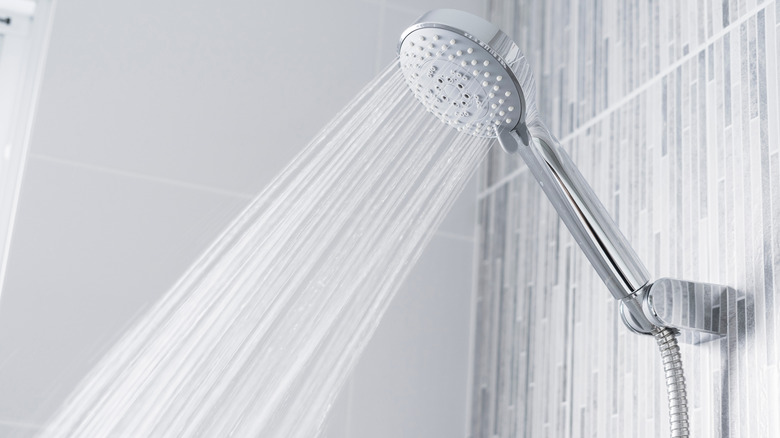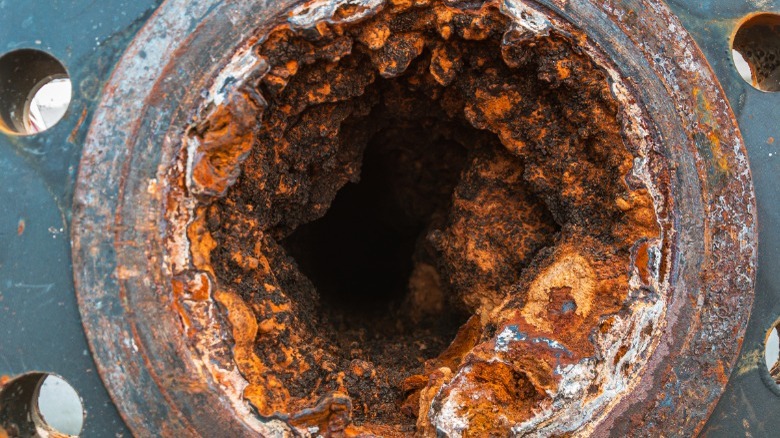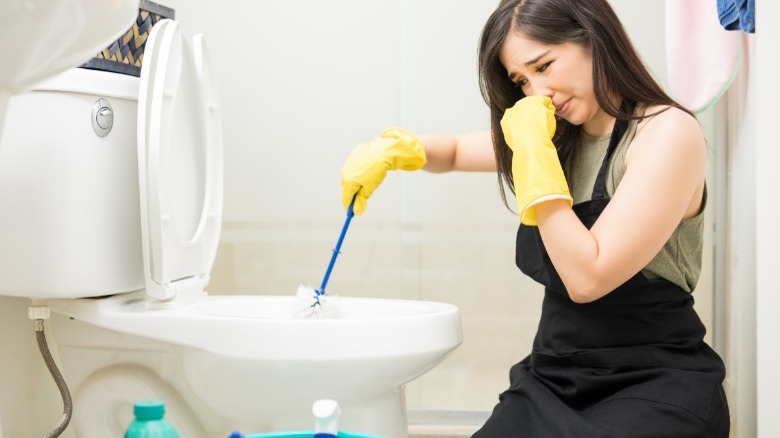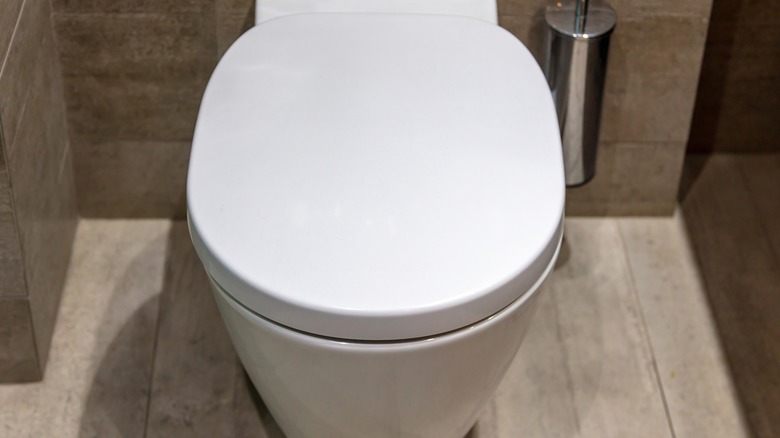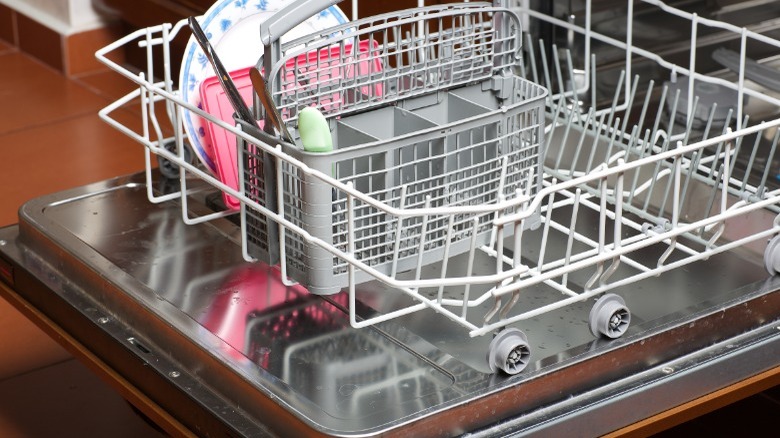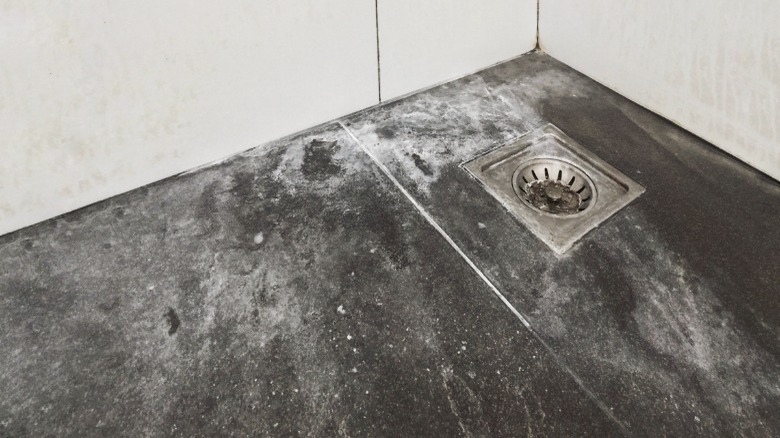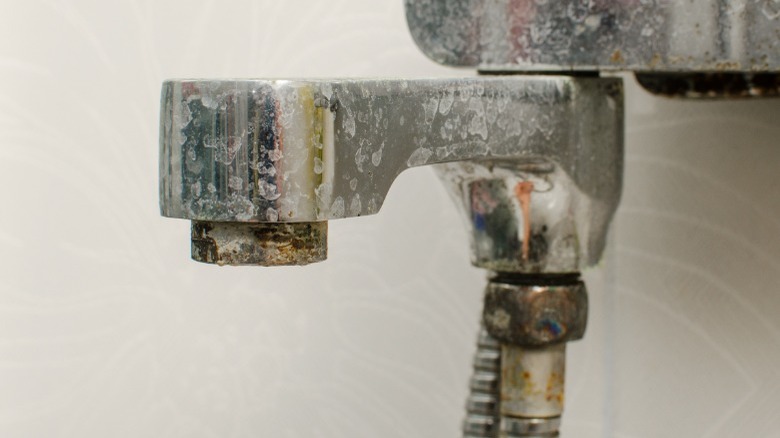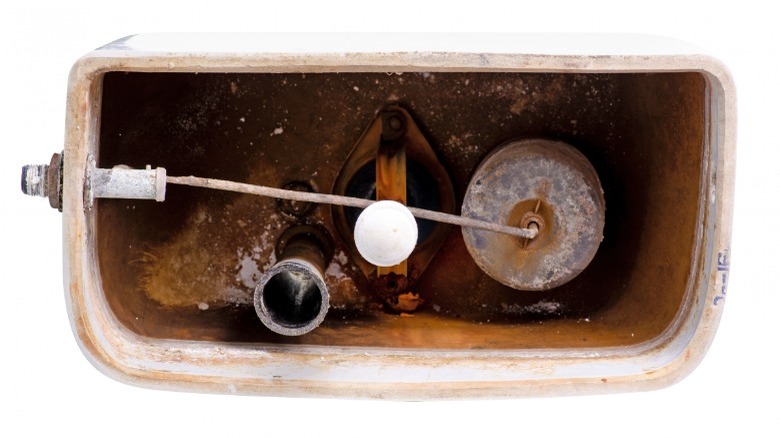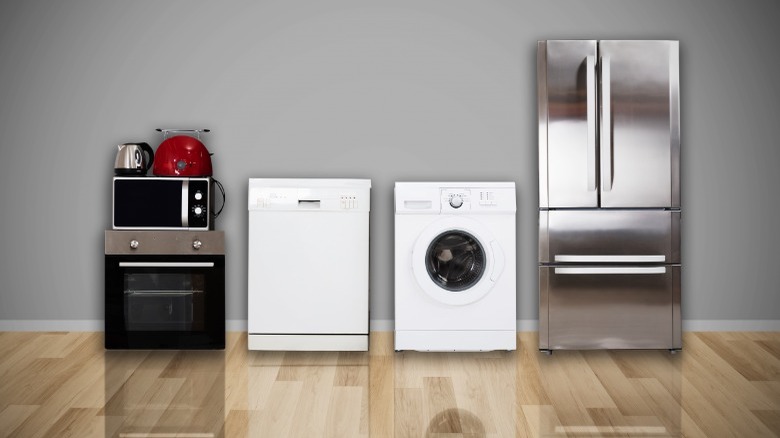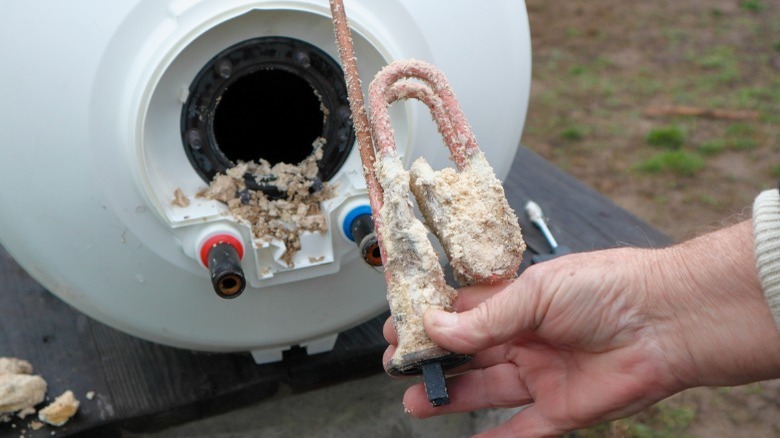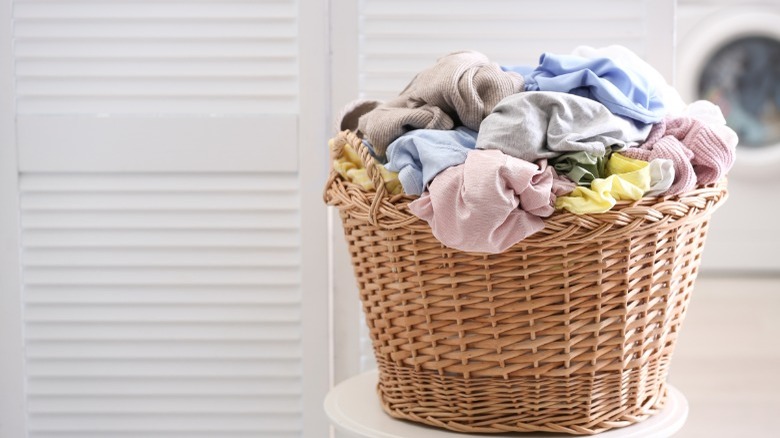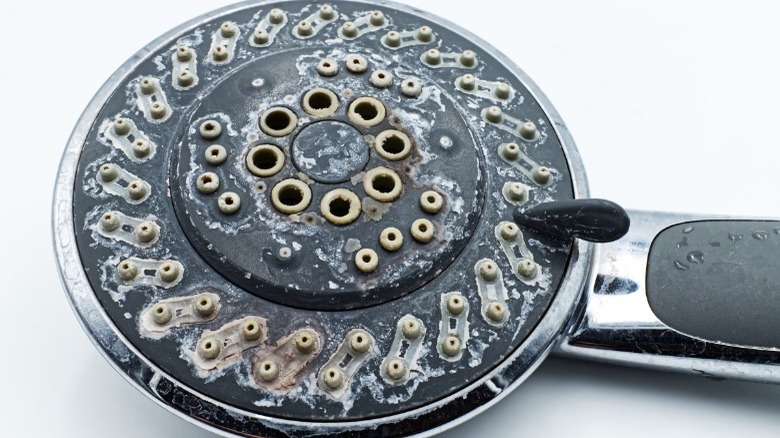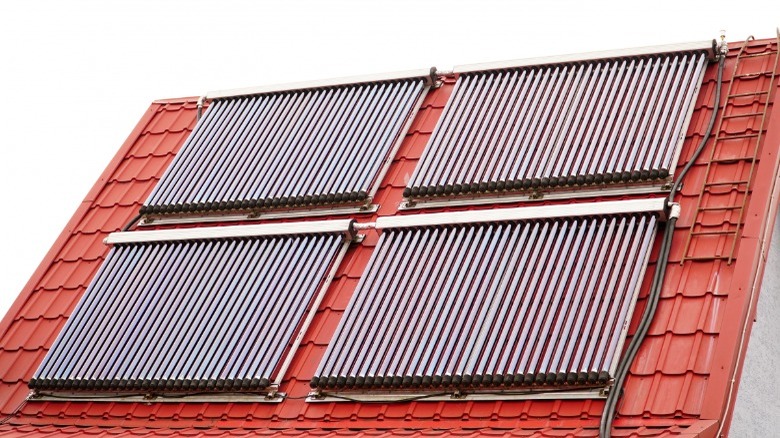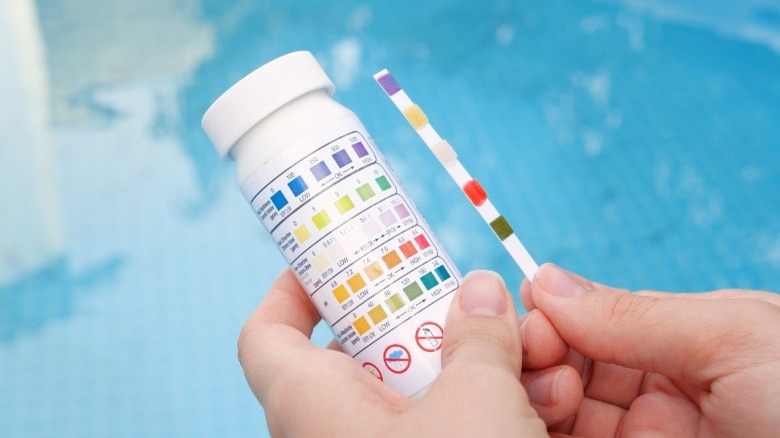The Horrors That Hard Water Can Cause In Your Home
As anyone who has hard water can attest, it can certainly transform your home into a little shop of horrors! But what does it mean to say your water is "hard," exactly? Ir refers to the level of minerals that leach into the water as it filters through soil and rocks. If the mineral level is particularly high, the water may have a chalky or chemical taste. Though not considered hazardous to your health, calcium and magnesium are the main culprits for house woes. They are most evident in the stains, residue, and deposits they leave behind, whether that's in toilets or tile grout. They can also clog your pipes and corrode your sink fixtures, leading to pricey plumbing bills.
The majority of people are concerned about what could be lurking in the water that flows through their taps. Luckily, testing your water at home with a kit is pretty easy if you're ready to face your fears. If you find you have hard water, there might be some cause for concern. Here are the issues it can cause in your home.
Occluded pipes
Probably one of the biggest horrors of hard water in the home is its effect on your plumbing. Namely, occluded pipes. Because of its high mineral content, when hard water travels through your pipes, it leaves a hard, scaly buildup behind. Over time, the buildup can get so thick that it clogs or slows the water flow. Besides this effect on water pressure, the buildup can also cause other problems.
For example, other food and hair will tend to get caught in the scaly buildup and clog the pipes faster and more frequently. This can eventually cause the pipes to crack under pressure and leak water elsewhere. That result would show up as an increase in your water bill. Once your pipes become blocked due to hard water deposits, you'll have to replace them. One thing you can do to try to stave off the inevitability is to pour vinegar down the drains every few months or so to keep buildup to a minimum.
Foul smell
Imagine the horror when your mother-in-law uses the bathroom, turns on the water, and the putrid odor of rotten eggs permeates the air. Once you both recover from the humiliation, it's time to address the problem! That unpleasant and unmistakable smell is caused by hydrogen sulfide gas, which is naturally found in well systems. Incidentally, wells are more likely to produce hard water due to the minerals taken on from the ground. The hydrogen sulfide gas results from naturally occurring sulfur bacteria and its chemical reactions with the soil and rocks. Hard water in your hot water heater creates the perfect environment for the sulfur bacteria to multiply, making this a common hotspot.
The first thing to do is determine more precisely where it's coming from. To do this, go to each sink individually and try turning on the hot water first. Let it run for about 10 seconds and shut it back off. Notice if you smell the rotten egg stench or not. Then repeat with the cold water. Do you still notice the foul smell, or has it faded? Try to pinpoint if the odor is coming from the hot water, the cold water, or both. In most cases, the smell will be localized in the hot water, meaning the water heater is probably the culprit.
You can first try to clear out your pipes by simply turning on all the taps in the house and allowing them to flow freely for at least 10 minutes. If this doesn't solve the problem, it's best to call a plumber. You may need to have the water heater flushed out and disinfected, or you may need another type of water treatment.
Red stains in toilet
Another mineral often found in abundance in hard water is ferrous sulfate, commonly known as iron. If you see reddish-colored stains in your toilet bowl, shower, or bathtub, it may be due to a high concentration of iron in your hard water. High iron content in hard water will sometimes result in reddish-brown or reddish-orange stains that can be tough to get rid of. High iron content in hard water turns to rust, which is what these stains really are. It can also stain plumbing fixtures and even laundry.
To remove these stains, try using white vinegar or straight lemon juice. If that doesn't work, try making a paste out of baking soda and white vinegar and smear the paste on the stains. Leave them for about 20 minutes, and then scrub them out. If all else fails, CLR Calcium, Lime & Rust Remover should do the trick in this case. Unfortunately, you'll need a special water treatment to permanently fix the iron content problem. Otherwise, it could be an ongoing issue.
Water stains or spots
Another common hard water horror is the dreaded water spots left behind on clean dishes. This can be especially frustrating when unloading your dishwasher to find hard water spots on everything! Luckily, these stains are removable, albeit tenacious. If you have hard water, white vinegar is about to become your new best friend and a necessity around the house.
For assistance in the dishwasher, white vinegar makes the perfect rinsing agent. You can pour straight vinegar into the spot the rinse agent usually goes in your dishwasher. Alternatively, a bowl filled with vinegar placed on the top rack before starting it will accomplish the same results.
Likewise, a spray bottle with white vinegar and water is the perfect solution for cleaning tubs, showers, and sinks with chalky water stains. Spray it on hard water stains and leave it for at least 15 minutes before wiping it down. Unfortunately, this is an ongoing part of dealing with hard water in your home.
Leaves soap scum behind
Most people have had the experience of dealing with soap scum at one time or another. Soap scum is exacerbated by the minerals in hard water, preventing the soap from doing its job effectively. Normally, the molecules in soap bind with water and the dirt from our skin, and when we rinse off, it all goes effortlessly down the drain. However, the high mineral content in hard water blocks the binding process, forming an excess of the grayish-white film we recognize as soap scum. This persistent substance sticks to showers, bathtubs, sinks, shower curtains and the like. Soap scum also contains body oils, dead skin, dirt, and even hair. Unfortunately, this is also part of the ongoing battle for those dealing with hard water.
Once again, white vinegar comes to the rescue with a couple of different recipes to try and remove it. There are products made for removing soap scum, but natural methods often work just as well. The first option mixes 1 part baking soda and 2 parts vinegar, which causes a chemical reaction that will fizz. Apply it as it's fizzing, and let it sit for 15-20 minutes before wiping it down with a clean cloth. Rinse and dry when finished. You can also try liquid dishwashing soap, vinegar, and water in equal parts mixed up in a spray bottle. Spray on soap scum stains and leave for 10 minutes before rinsing with hot water and drying.
Faucets become corroded
Corroded faucets are yet another hard water horror that people must endure. The minerals in hard water also cause the corrosion of metals in faucets. Hard water corrosion is not only an aesthetic nightmare but also affects functionality. It can cause problems with the flow of your water, make it difficult to turn the handles, and even stop the faucet's function altogether. It's important to remove corrosion before that happens.
Certain metals are more prone to corrosion from hard water than others due to how it occurs. As previously discussed, hard water contains a higher level of certain minerals. Which minerals largely depend upon where you live and what's in the ground there. Calcium is typically one of the highest and forms calcium chloride, which attacks copper and stainless steel in particular. It results in pitting, corrosion, and (often) calcium buildup.
You can clean corroded faucets to slow down the process, but you should always use DIY methods rather than chemical-based cleaning products. This will preserve the life of the taps and prevent discoloration. Eventually, however, they will need to be replaced. Once again, our old standby vinegar is recommended for the job. Ideally, you'll want to soak the faucet area in straight white vinegar for about 15-20 minutes, then wipe it down and rinse it off. Always rinse and dry the area after using vinegar. Alternatively, if you can't soak it, soak a rag in vinegar and hold it there for about the same amount of time. Wipe down with clean water and dry.
Black manganese stains in toilet tank
Manganese is a naturally occurring mineral humans actually need in smaller quantities, but ideally not through our drinking water. High levels of manganese in your hard water can result in black stains in places like your toilet tank or dishwasher. Unfortunately, this mineral is not easy to remove from your water, even with a water softener. You would need a special treatment for that, and it would need to be done in addition to a water softening system, or else it can shorten its lifespan significantly.
One good way to remove the stains the mineral makes is with Coca-Cola. You can pour it right in the toilet or dishwasher where the stains are, as soaking them is most effective. You can also soak paper towels in the Coke and apply them to the stains. The key is to leave it to soak into the stains for several hours or overnight. If that doesn't work, we're back to good old vinegar and baking soda to do the trick!
Appliances are less efficient
Appliances that use a lot of water, such as the dishwasher, washing machine, refrigerator, and water heater all run less efficiently with hard water. In fact, using hard water with these appliances can decrease their lifespan by 30-50%. Hard water is hard on machines just like it's hard on the other surfaces it has prolonged contact with. Pipes that carry hot water are more prone to corrosion, though it occurs in all pipes hard water flows through.
Limescale and sediment from hard water minerals cause significant problems for water-using appliances. When they have to work twice as hard to do their jobs, their efficiency is reduced, and you'll eventually see an increase in your energy bills. The problems from hard water in your appliances can result in leaks and reduced water flow. Replacing parts and maintenance calls are common. Many homeowners decide to put in a water-softening system to help reduce the adverse effects of hard water.
Limescale on water heater increases energy and heating costs
According to HomeWater 101, hard water limescale is so taxing on your hot water heater that it can raise energy costs by 29%! As we discussed with appliances, limescale builds inside the water heater and causes problems. The tank in particular is vulnerable to excessive deposits. The heat provides the perfect incubator for turning the minerals into limescale at a faster rate.
The layers of limescale grow and line the entire surface of the interior walls, further insulating the heated tank. With no way for heat to escape, the tank overheats and reduces its lifespan. Additionally, the sediment that lines the bottom of the tank causes it to work less efficiently and raises energy costs. If you have hard water, you may need to flush the tank in your water heater every three months or so. Overall, you can expect a significant reduction in performance and life expectancy from your water heater if you have hard water.
Shortens lifespan of clothes
Yet another hard water horror is the toll it takes on your clothes! When you have to wash your clothes in hard water, certain signs can begin to show up to warn you that something's amiss. For example, fabrics tend to fade quickly and start to yellow or gray easily. They may even get streaked gray or white. Even after washing and drying, materials remain stiff. Some of these fabrics become weakened and tend to tear or rip easily.
Additionally, clothes don't get as clean in hard water because the detergent doesn't mix well with the minerals. Sometimes there will be a residue left over after washing. There are a few steps you can take to reduce the effects of hard water on your laundry. For one thing, start using liquid detergent. You can also add ½ cup of borax, which acts as a water softener for each load of laundry. Testing your water for hardness can help you understand how to combat it best.
Calcification on shower heads and faucets
Due to calcification, shower heads and faucet taps will need to be cleaned more often when using hard water. Calcium deposits are a problem wherever water flows into your home, caused by the mineral content in hard water. These deposits cause the same kinds of issues that corrosion does. This can include interrupting the directional flow and experiencing water pressure reduction. They're also not pretty to look at, and can be humiliating if anyone else sees them!
Removing calcium deposits is easy with our old friend vinegar. If your shower heads are removable, just immerse them in a bucket of vinegar and leave for at least two hours, until the deposits come off easily with a toothbrush or equivalent. The only exception is if your shower heads are made of iron, in which case vinegar will take the finish off. You can also use products like Bar Keeper's Friend or Lime Away, or something made specifically to be safe on iron.
If your shower heads are not removable (and not iron,) you can take a plastic bag and fill it with vinegar, then wrap the shower head in the bag. Tie the neck off with a rubber band or zip tie and leave it on for at least two hours, possibly overnight. Check every two hours to see if you can remove the deposits easily. Wipe down with a microfiber cloth when finished.
Limescale builds up in solar heating systems
If you happen to have a hydronic solar heating system, hard water can likewise cause problems with mineral deposits. Limescale can cause significant problems like valve and pump failures and overall performance issues. Scaling can build up in the collector, the distribution piping, and the heat exchanger when using water as the heat transfer fluid. To keep this from happening, we will need a little help from our best friend.
Vinegar can be used to flush the solar water heater at least annually. You can actually do it every few months, which is advised if the hardness level is high. To flush out the system is easy: Simply turn it off and allow all the water to flow out. Afterward, pour vinegar into the system and let it sit for a few hours. Flush the vinegar out completely, then fill it with fresh water before starting. Doing this often will keep scale buildup to a minimum.
Calcium scaling in your swimming pool
Unfortunately, calcium scaling and buildup also occur in the swimming pool. Two types can occur. The easiest kind to remove is calcium carbonate, which can be removed from hard surfaces like tile or concrete with a pumice stone. You can also purchase calcium scale treatments safe for all surfaces from pool suppliers. The treatments typically dissolve in the water, and they will remove the deposits over several weeks.
Calcium silicate is tougher to remove, but with enough time and elbow grease, you can usually remove it with a pumice stone. However, if you have a vinyl or fiberglass pool, it will require the help of a professional. Keeping the pH balance lower can help prevent calcium buildup, as well as installing an automatic pool cover to reduce evaporation. Hard water causes many horrors throughout your home, and the swimming pool is not excluded. You might want to consider a water-softening system, or purchase a large supply of vinegar ...
